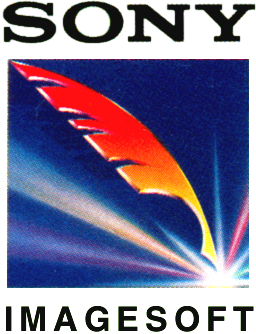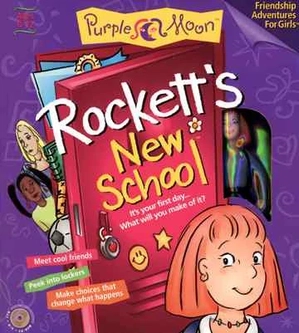
Sony Imagesoft Inc. was an American video game publisher that operated from 1989 to 1995 and was located in California. It was established in January 1989 in Los Angeles, California, as a subsidiary of the Japan-based CBS/Sony Group (CSG) and initially named CSG Imagesoft Inc. Their focus at the beginning was on marketing games exclusively for Nintendo consoles.

The relationship between women and video games has received extensive academic and media attention. Since the 1990s, female gamers have commonly been regarded as a minority. However, industry surveys have shown that over time, the gender ratio has become closer to equal. Beginning mainly in the 2010s, women have been found to make up around half of all gamers. The gender ratio differs significantly between game genres, and women are highly underrepresented in genres such as first-person shooters and grand strategy games. Sexism in video gaming, including sexual harassment, as well as underrepresentation of women as characters in games, is an increasing topic of discussion in video game culture.

Barbie: Super Model is a one or two-player educational action video game that allows the player to play as Barbie. It was released for the Sega Genesis, SNES and MS-DOS in 1993.

Jurassic Park Interactive is an action video game based on the 1993 movie Jurassic Park. It was released in North America on May 10, 1994 exclusively for the 3DO Interactive Multiplayer by Universal Interactive Studios. Jurassic Park Interactive was the first video game released by Universal Interactive Studios.
Suzanne Lacy is an American artist, educator, writer, and professor at the USC Roski School of Art and Design. She has worked in a variety of media, including installation, video, performance, public art, photography, and art books, in which she focuses on "social themes and urban issues." She served in the education cabinet of Jerry Brown, then mayor of Oakland, California, and as arts commissioner for the city. She designed multiple educational programs beginning with her role as performance faculty at the Feminist Studio Workshop at the Woman's Building in Los Angeles.

lonelygirl15 is an American science fiction thriller web series created by Miles Beckett, Mesh Flinders, Greg Goodfried, and Amanda Goodfried. It was independently released on YouTube from June 16, 2006, to August 1, 2008, and was also briefly released on Revver and Myspace. The series revolves around the initially mundane life of homeschooled 16-year-old Bree Avery, who uses the username Lonelygirl15 online. She goes on the run with her friend Daniel after her parents' mysterious religion is revealed to be The Order, a blood-harvesting operation that wants her "trait positive" blood. The series is presented through video blogs, or vlogs, originally recorded solely from Bree's bedroom.

Mattel Interactive was a video game publisher and software distributor.

Anita Sarkeesian is a Canadian-American feminist media critic. She is the founder of Feminist Frequency, a website that hosts videos and commentary analyzing portrayals of women in popular culture. Her video series Tropes vs. Women in Video Games, examines tropes in the depiction of female video game characters. Media scholar Soraya Murray calls Sarkeesian emblematic of "a burgeoning organized feminist critique" of stereotyped and objectified portrayals of women in video games.

The American Girls Premiere is an educational computer game developed and published by The Learning Company for American Girl. The game allows players to create theatrical productions featuring characters from American Girl's Historical collection, along with scenes and other elements unique to each of the girls' respective time periods.

The portrayal of gender in video games, as in other media, is a subject of research in gender studies and is discussed in the context of sexism in video gaming. Although women make up about half of video game players, they are significantly underrepresented as characters in mainstream games, despite the prominence of iconic heroines such as Samus Aran or Lara Croft. Women in games often reflect traditional gender roles, sexual objectification, or stereotypes such as the "damsel in distress". Male characters are frequently depicted as big and muscular, and LGBT characters have been slow to appear due to the cis-heteronormativity of the medium.
Sanctuary Woods Multimedia, Inc. was a Canadian-American multimedia developer and third-party game publisher. It was one of the early multimedia companies developing products for CD-ROM distribution. The founders, Brian Beninger and Toni Beninger, were both experienced technologists who saw the potential for developing family-oriented and educational multimedia projects when Apple Inc. released Hypercard.

Disney's Animated Storybook is a point-and-click adventure interactive storybook video game series based on Walt Disney feature animations and Pixar films that were released throughout the 1990s. They were published by Disney Interactive for personal computers for children ages four to eight years old. Starting from 1994, most of the entries in the series were developed by Media Station. They have the same plots as their respective films, though abridged due to the limited medium.

Chop Suey is a point-and-click adventure game developed and published by Magnet Interactive Studios for the Macintosh in 1995. It was developed by Theresa Duncan and Monica Gesue to be a story disc for girls. Art is by Ian Svenonius, music and sound is by Brendan Canty, and narration is by author David Sedaris.

Santa Fe Mysteries: Sacred Ground is a video game, the second in the Santa Fe Mysteries series after The Elk Moon Murder.
Detective Barbie is a series of three mystery themed point and click adventure games starring the character Barbie. The series consists of Detective Barbie In the Mystery of the Carnival Caper! (1998) Detective Barbie 2: The Vacation Mystery (1999), and Detective Barbie: The Mystery Cruise (2000). The first two games were developed by Gorilla Systems Corporation and published on the PC by Mattel Media/Mattel Interactive. The third game was developed for the PlayStation by Runecraft.
Let's Talk About Me is a 1995 girl-oriented activity centre video game developed by GirlGames Inc. and team smartyPants!, and published by Simon & Schuster Interactive. It was released on Macintosh, Windows, and Windows 3.x. A sequel entitled Let's Talk About Me Too was released in 1997.

Rockett's New School is a 1997 girl-oriented video game developed by Silicon Valley-based Purple Moon. It was directed by Brenda Laurel.

Magic Fairy Tales: Barbie as Rapunzel is a 1997 educational adventure game developed by Media Station and published by Mattel Media.

Santa Fe Mysteries: The Elk Moon Murder is a video game, the first in the Santa Fe Mysteries series, followed by Santa Fe Mysteries: Sacred Ground. In The Elk Moon Murder, a famous Native American artist named Anna Elk Moon is murdered in the American Southwest.

Rugrats Adventure Game is an educational adventure point and click video game based on the Rugrats television series released for Microsoft Windows and Macintosh on September 30, 1998. It was developed and published by Broderbund. The game follows Tommy Pickles and friends Chuckie, Phil, and Lil as they try to rescue Tommy's beloved toy Reptar from being thrown out as garbage. The game incorporates point and click gameplay, with characters and objects appearing in different locations even after the player has visited them once. Angelica, the series' main antagonist, appears in the game to help further the story and ultimately become the game's main villain.
















